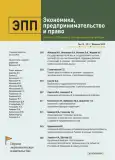Vol 13, No 2 (2023)
- Year: 2023
- Articles: 23
- URL: https://journals.eco-vector.com/2222-534X/issue/view/8084
Articles
Public policy and public-private partnership as a tool to support businesses and the public in a challenging economic environment: political economy analysis
Abstract
 245-258
245-258


Assessing the development performance of the socio-economic system of the Republic of Belarus
Abstract
 259-272
259-272


Interrelationship of welfare and well-being dimensions from a regional perspective
Abstract
 273-296
273-296


Concept of regional agglomeration policy
Abstract
 297-316
297-316


Value-based management of the territory brand
Abstract
 317-330
317-330


The economic potential of the region: problems and prospects for the development of small and medium-sized businesses
Abstract
 331-342
331-342


The concept of sustainable competitiveness of industrial clusters in Russia: the main provisions
Abstract
 343-364
343-364


Topical factors of strategic industrial competitiveness of the constituent entities of the Russian Federation in the new environment
Abstract
 365-380
365-380


Subjects of industrial policy: essence and composition in modern Russia
Abstract
 381-400
381-400


Russia's energy sector: an economic dimension
Abstract
 401-412
401-412


Development of the constructional materials production in foreign practice
Abstract
 413-426
413-426


Improving solid waste management in an intersectoral circular economy planning
Abstract
 427-446
427-446


Economic justification of the territorial location and industry specialisation of the regional agro-industrial complex
Abstract
The results of the assessment of the territorial location and zonal specialization of grain production in the Omsk region are presented. The theoretical aspects of the spatial location of the regional agricultural sector are considered. The main factors of the agricultural territory development that ensure the formation of local zones of agricultural production are identified. The authors' methodology for determining the effectiveness of the actual placement of agricultural crops has been developed; individual efficiency indices have been proposed. These indices characterize the natural and cost indicators of production. An assessment of the efficiency of grain production allocation is carried out. The example of the most important crop, wheat, is used.The grouping of municipal districts in the region according to the level of wheat grain production efficiency was carried out. Based on the grouping, a cartogram of the Omsk region is constructed, where the areas of wheat grain production are displayed, indicating the areas of highly efficient agricultural production. The economic efficiency of transforming the territorial location of wheat production is determined.Funding:The study was carried out within the framework of the state task of the Ministry of Agriculture of the Russian Federation.
 447-462
447-462


The need to optimize the national agricultural insurance system in the face of growing climate risks
Abstract
 463-476
463-476


Economic activity in agribusiness as an essential link in specialised management
Abstract
 477-494
477-494


Improving the management of innovation development of regional television broadcasters amidst digital transformation
Abstract
 495-512
495-512


Sustainability indicators for companies in the hospitality industry
Abstract
 513-522
513-522


Marketing communications in the hospitality industry in a turbulent national economy
Abstract
 523-536
523-536


Development of the advertising agency of the future
Abstract
 537-550
537-550


Staff training in a modern organization: focus on digitalization
Abstract
 551-566
551-566


Reputational capital indicators of leading international companies
Abstract
 567-576
567-576


Current approaches to minimising the risks of corporate financial reporting fraud
Abstract
 577-586
577-586


The benefits of artificial intelligence and neural networks in the legal system of the Russian Federation
Abstract
 587-600
587-600













